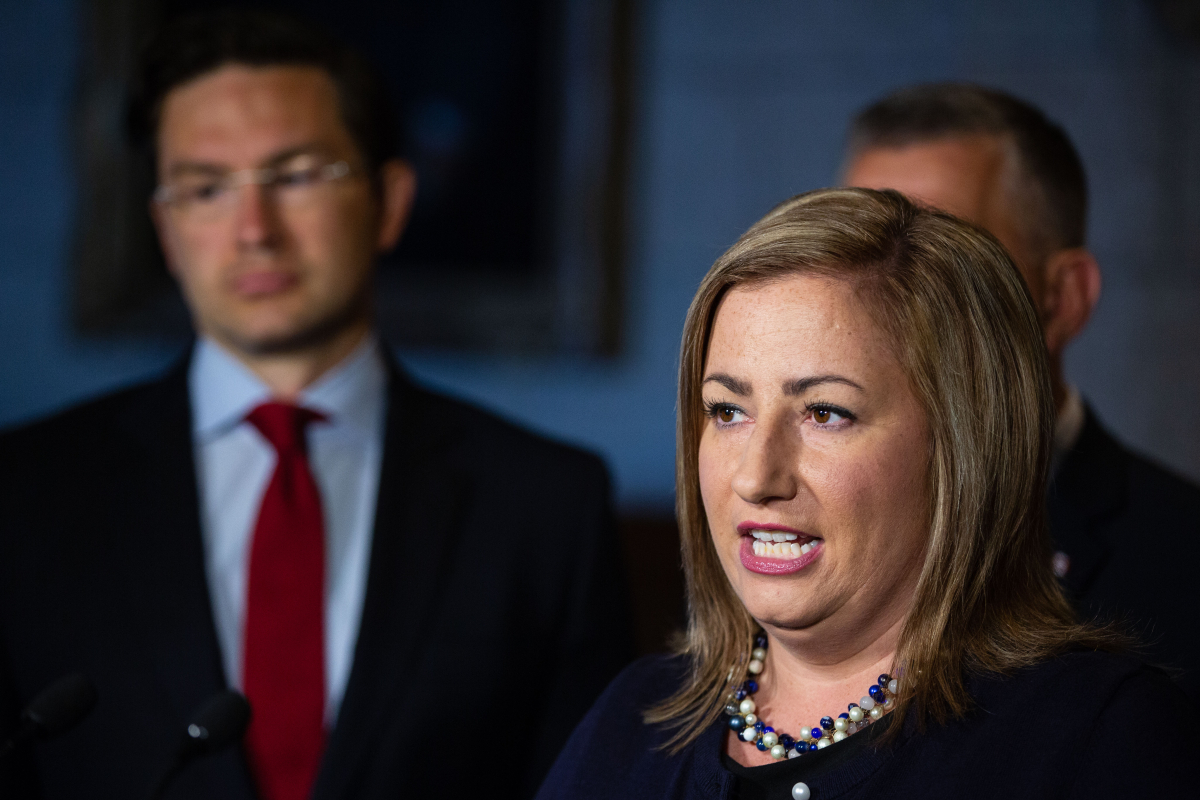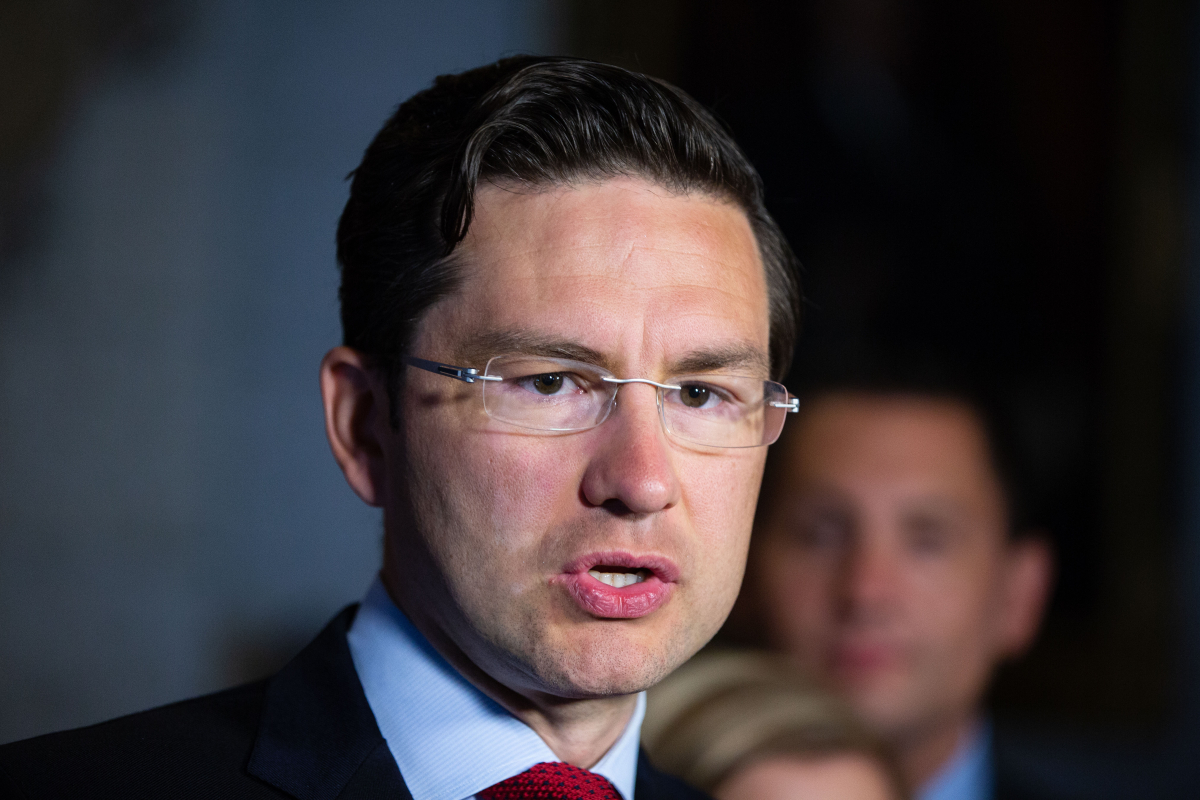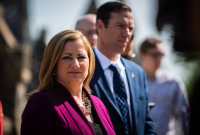Support strong Canadian climate journalism for 2025
Federal Conservatives denied responsibility on Tuesday for a "critical" mistake made under their watch, which has left a major west coast oil pipeline and tanker expansion in limbo.
Instead, Tory MPs pointed the finger at Prime Minister Justin Trudeau's government for failing in its own due diligence, in the wake of a stunning Aug. 30 decision by the Federal Court of Appeal. The ruling quashed Trudeau's November 2016 approval of the Trans Mountain pipeline expansion project. Moments later, shareholders of Texas-based Kinder Morgan voted almost unanimously to sell their interests in existing Trans Mountain pipeline system to the Canadian government for $4.5 billion.
While the ruling blamed both the Harper and Trudeau governments for the mistakes that led it to revoke the approval, Tory finance critic Pierre Poilievre summoned reporters to a news conference on Tuesday to criticize Trudeau.
“The process was approved by the Liberal cabinet in spring 2016, which was Justin Trudeau’s statement that he had completed all the necessary steps for the project to go ahead,” said Poilievre, ahead of an emergency meeting of the House of Commons natural resources committee.
“To try and blame the Conservatives for something that happened six or seven months after Justin Trudeau took office, for decisions that his government had made exclusively after he took office, is a little bit rich."
The Trans Mountain expansion is now facing uncertainty in the wake of the ruling which has brought construction to a halt, until the government addresses the mistakes outlined in the unanimous court ruling, signed by Justice Eleanor Dawson.
Dawson wrote that the Trudeau government was given "flawed" recommendations by the National Energy Board (NEB), which had been tasked by the Harper government to review the pipeline expansion. Dawson wrote that the NEB made a “critical error” when it decided not to include tanker traffic, a move the court said sparked a chain reaction of “unacceptable deficiencies" that tainted the NEB’s final report.
The NEB, which says it operates at arms length from the government, took that so-called “scoping” decision on April 2, 2014, during the 2011-2015 majority government of former Conservative prime minister Stephen Harper. The review was done under rules that were changed by a major overhaul of Canada's environmental laws by the Harper government in 2012.
Several critics, including federal Liberals while in opposition, had warned that the process and rules set up by Harper were biased and damaging public confidence in the approval of major projects.
Former energy executive 'gratified' by court decision
One independent expert, former BC Hydro chief executive Marc Eliesen, even went public with his frustrations in 2014, highlighting one of the errors that would later factor into the court's decision.
Eliesen had previously applied and was accepted to participate in the NEB hearings into the Trans Mountain expansion. But a few months into the process in 2014, he publicly announced he was withdrawing from the regulator's review, calling it a “farce” and a “fraudulent process.”
In a scathing letter, sent on Oct. 30, 2014, the retired energy executive noted that the regulator had rejected numerous requests from other participants who were seeking more information, including questions about marine and tanker safety that were sent by the B.C. government, at the time led by former Liberal premier Christy Clark.
The board responded to the B.C. government’s queries by stating that these questions were “unreasonable or overly broad in scope” and “would not be material to the Board’s assessment.”
Eliesen said anyone who was trying to press the company for answers about the project’s safety ran up against the same wall that was put up by the NEB.
“I noticed the pattern taking place with most of the other interveners — that roughly 80 to 85 per cent of the questions that they put forward, that they wanted answered, were not answered and the board went with Kinder Morgan in denying any fuller answers,” he told National Observer in an interview.
“That was one of the factors which led me to believe that this process was biased, that the board was a captured regulator and I’m quite gratified with the Federal Court of Appeal decision, that particularly in the marine and tanker area, that they saw the deficiency in what the NEB had undertaken."
Alberta's NDP Premier Rachel Notley has also noted that the latest legal setback originates with Harper's decisions, but has urged the Trudeau government to fix it.
After it was elected, the Trudeau Liberals introduced an interim process in January 2016 to improve federal oversight of major projects and restore public confidence, in the wake of Harper's 2012 reforms. The process was meant to expand consultations with First Nations and members of the public.
But Conservatives opposed this move with newly-minted natural resources critic, Candice Bergen, saying at that time, that this was bad news for industry, adding an extra "layer" in approval processes and another time delay.

Motion to force ministerial appearances defeated
NDP MP and committee member Richard Cannings said there was plenty of blame to go around.
"The Liberals do deserve some of the blame here, but the irony in calling this meeting is, this is a problem that was created by the Conservatives in the previous government," he said.
Cannings blamed the Tories for “creating this mess” and the Liberals for “failing to clean it up.” He highlighted the Coldwater Indian Band, whose aquifer supplying the sole source of drinking water for most residents of the reserve was crossed by the pipeline route.
"There's no evidence that actually acting on that concern was ever considered,” he asserted. "The government knows what proper consultation is — they should," he added. It requires a "sincere desire to address concerns.”
On Tuesday, the natural resources committee defeated a motion by Tory natural resources critic Shannon Stubbs to summon Natural Resources Minister Amarjeet Sohi and Finance Minister Bill Morneau to a meeting to explain what went wrong with the Trans Mountain approval process.
Stubbs noted the then-natural resources minister, Jim Carr, had said he was satisfied that extra consultations with First Nations would placate the courts.
"The ruling on Thursday is very clear," she said, "it was the failure on that process."
Poilievre doubled down on his comments about Liberal culpability during the committee discussion, saying "it was Justin Trudeau's process. It was a process approved by Justin Trudeau's cabinet in 2016.”
"We expect they'll try to blame everybody but themselves,” he said.

Liberals assessing next steps, say MPs
The government has yet to say if it will appeal the decision to the Supreme Court of Canada.
"It is their obligation and their responsibility to disclose urgently and clearly exactly what the next steps will be," argued Stubbs. "There are options clearly available for the Liberals...we hope to see them make those proposals.”
Liberals laid the blame on the Conservatives.
"For the past 10 years, the Harper Conservatives had the opportunity to diversify markets and get pipeline to tidewater,” said Marc Serré, a Liberal MP on the committee.
"We inherited an environmental process that was flawed and we made efforts to improve the process.”
Serré said the government was taking “the appropriate time to review the decision and assess next steps.” And he repeated the Trudeau government’s mantra, that "the facts and evidence demonstrate that it is in the national interest.”
"This was not our first choice, but it was the right choice to protect thousands of jobs.”
Paul Lefebvre, parliamentary secretary to the Minister of Natural Resources, echoed Serré’s comments after the meeting.
“The Federal Court of Appeal decision has been rendered, it’s a lengthy decision, there’s a lot of information in there that we need to review,” said Lefebvre, “and to make sure that on an ongoing basis, that we’re respecting our obligations with respect to consulting First Nations, and making sure that we’re protecting the environment.”
The Conservatives also failed in an effort on Tuesday to summon Trudeau's ministers to testify before the parliamentary committee about what went wrong because Liberal MPs used their majority to defeat the Tory motion.
- with files from Mike De Souza






Comments
Pierre Polievre. The single most mendacious and deceitful pissant of all the Conservative MPs in the Harper governments with the possible exception of all the other mendacious, deceitful pissant MPs of the Harper governments. That anyone, anywhere gives any credence whatsoever to anything this slug of a boy says speaks derisive volumes about the desperately depraved state of Canada's Parliament.
Here! Here! couldn't have described the little creep better myself.
There is something particularly unctuous about that man, is there not. I thought defeat temporarily humanized him, but its obvious he's back in top form. Thankfully, I didn't have to watch him live....a strangely creepy experience. Why do enough voters not get the vibes? What gets him re-elected?
We mustn't be naive. There are enough Canadians to vote in even a Nazi party. It's not their fault that they are misinformed, so it is up to us to fix things, not disrespect them.
Nope. Absolutely not. No respect for nazis. That amounts to normalization and accommodation. You can if you wish but no pissing and moaning when they turn on you.
Love it! The Libs blaming the Cons and the Cons blaming the Libs. Only the NDP makes sense. Can the nasty project and save our environment (and us) by spending money on green technology.
If only that were still true. Notley has done a fine job of blowing up any environmental chops the NDP may have once had and the silence from the Ottawa office on the matter has only made it worse. I was a lifelong NDP voter (I'm 70 this year) but once Jack Layton threw the National Daycare program and the Kelowna Accord both under the bus in order to support Stephen Harper I tore up my membership card. We don't have a socially democratic party in Canada any more - if we did I'd be among the first to join but we don't. All todays NDP are is a pale version of the '70s Liberals. Tommy Douglas has been rooting around in his cabinets looking for his boxing gloves I'm sure.
That is a very strange reading of what Layton did. Although it's true that, like all the other parties, the NDP have drifted to the right over the decades. I would really like to see proportional representation in part because I'd be pleased to see a further-left party be viable and able to hold the NDP's feet to the fire.
That is exactly what Layton did. He abandoned social justice principle in favour of electoral opportunism. Historically NDP support of non-confidence motions is sorry story of miscalculation and this is just the sorriest chapter.
So, who then?
So, who then?
Good question. I may vote Green, I may refuse the ballot. I'll decide when it's time to decide. I certainly will not vote either Conservative or Liberal. Since I became eligible to vote in the late '60s I'd always voted NDP right up until 2011. I can't any more because I don't think the NDP knows why it exists any more.
"We expect they will try to blame everyone but themselves," [Poilievre] said. Typical comment from him. Clearly, he expects everyone to act the same way he does.
It's certainly some master-level projection. At the same time, he's not wrong.
"We expect they will try to blame everyone but themselves," [Poilievre] said. Typical comment from him. Clearly, he expects everyone to act the same way he does.
The real blame for this lies with everyone in Canada who failed to protest this entire reckless and damaging oil/gas development of the tar sands - especially as time has shown there is actually very little market for the product and few buyers want to deal with such low grade product. A massive investment in the extraction and movement of this bitumen has done nothing but produce a dirty energy source and environmental liability in Alberta that no profits from the tar sands will ever remedy. All of that money - and the billions still on the table would have been better spent on sustainable technologies than on this folly.
Absolutely. And there is something about the propoganda of the Big Oil machine, CAPP chief among them, that keeps the silent majority believing that ripping up our boreal, destroying massive amounts of potable water, and snaking a dangerous bitumen pipeline here and there across our country, is going to create jawbs, and keep us 'advantaged'.
Truth is, we've just been pushing the collapse forward, onto our kids and grandkids. The mega profits go south...Alberta gets 1% royalties for most of its crud...fracking the bejesus out of everything may be the only oil and gas game that is still growing...........and if we don't see that as the mop up operation it is, we're truly living in fantasy heaven.
The one good thing is that old pipeline now belongs to us...the Canadian people. If we had any sense we'd put it to bed.....permanently. Unrefined dilbit doesn't travel well.........and at the end of the journey, we're not sure who wants it, other than the Kochs. It would make more sense to bite the bullet and refine it here...use it here...to transition off fossil fuels.
But I guess the neoliberal dream of infinite markets abroad is going to die very hard. For all of us.
As a rule, I expect that anything the media spends a lot of ink and pixels on how it will "create jobs" almost certainly will create very few jobs--especially compared to spending the same money doing something else. The people who can afford that kind of media push are precisely the people who pocket lots of windfall profits because they don't actually pay out a lot of wages. You don't see big media blitzes about how the fresh vegetable industry will "create jobs" even though obviously it creates lots of 'em, because the people who grow fresh vegetables are too busy paying (often very low, admittedly) wages to put their dollars into buying positive coverage.
"Under Stephen Harper's watch," Canadians learned the importance of evidence-based science and the need to preserve evidence of the acts committed by congenital liars, if we are not to imitate conditions in the corrupted "democracy" south of the 49th.
Has anyone compiled a list of Mr. Trudeau's accomplishments to date?
Yes, he has himself but it's subject to cabinet secrecy to protect sources.
"National Observer's Mike De Souza and Carl Meyer analyze the Federal Court of Appeal decision on the Trans Mountain pipeline approval in Ottawa on Aug. 31, 2018. Facebook video"
Facebook own this video? Made it? Please say it correctly.
How predictable; every defeated political party tries to rewrite history so that there will be spurious evidence to back up their claims. It gets increasingly hard to fool all of the people, even some of the time, even in the digital age awash with lies. Words can never salvage a reputation sullied by evil actions.